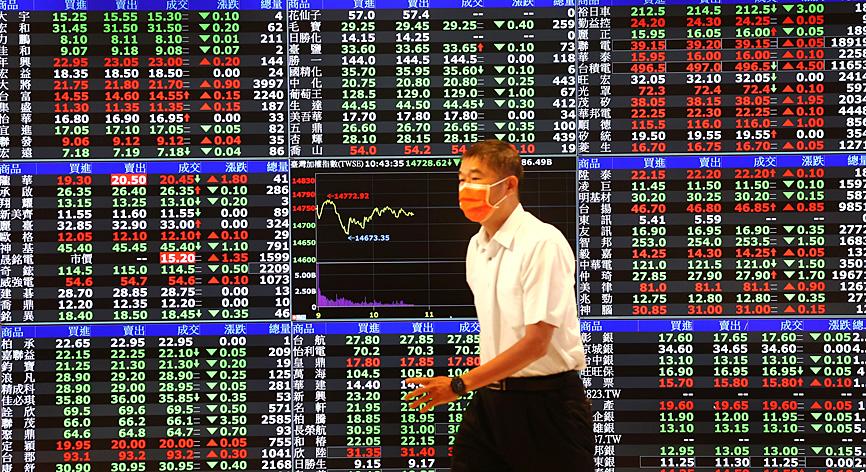The TAIEX yesterday rose 0.2 percent to close at 14,777.02 points after falling in the two previous sessions amid rising tensions across the Taiwan Strait.
However, turnover fell to NT$174.809 billion (US$5.83 billion), as most investors retreated to the sidelines amid US House of Representatives Speaker Nancy Pelosi’s visit to Taiwan.
Foreign institutional investors sold a net NT$6.12 billion of shares on the main board, compared with NT$19.66 billion net sold on Tuesday, Taiwan Stock Exchange (TWSE) data showed.

Photo: CNA
“Political issues were the main reason why transaction shrank lately,” Hua Nan Securities Investment Management Co (華南投顧) chairman David Chu (儲祥生) said by telephone.
Investors would observe the effects of China’s retaliatory measures and see if more Taiwan-made products would be banned from the Chinese market, Chu said.
The National Stabilization Fund is also expected to lend support to the market in the near term, he said.
The Chinese customs agency on Monday night banned the imports of more than 100 Taiwanese food brands. Beijing yesterday also banned imports of fruit and fish from Taiwan, and suspended exports of natural sand to Taiwan.
“Judging from the gains posted by semiconductor heavyweights, I suspected the stabilization fund entered the market to bolster market confidence amid worries over tensions with China due to Pelosi’s visit,” Concord Securities Co (康和證券) analyst Kerry Huang (黃志祺) said.
The NT$500 billion fund was on July 12 authorized to intervene in the equity market to serve as a buffer against unexpected external factors that might disrupt market movement.
“Many investors appeared reluctant to chase prices for the moment, as they continued to watch the impact from Pelosi’s visit,” Huang said, referring to military exercises that China is set to begin today in waters around Taiwan.
In yesterday’s session, contract chipmaker Taiwan Semiconductor Manufacturing Co (TSMC, 台積電) was the target of some late-session buying, closing up 1.85 percent.
Led by TSMC, the electronics sector edged up 0.79 percent, with the semiconductor sub-index rising 1.73 percent.
The non-tech sector, especially food stocks, continued to show signs of weakness as China imposed more economic restrictions on Taiwan in response to Pelosi’s visit, and an industry association for Taiwanese bakeries said on Tuesday that it would seek the government’s help in accessing other foreign markets.

MULTIFACETED: A task force has analyzed possible scenarios and created responses to assist domestic industries in dealing with US tariffs, the economics minister said The Executive Yuan is tomorrow to announce countermeasures to US President Donald Trump’s planned reciprocal tariffs, although the details of the plan would not be made public until Monday next week, Minister of Economic Affairs J.W. Kuo (郭智輝) said yesterday. The Cabinet established an economic and trade task force in November last year to deal with US trade and tariff related issues, Kuo told reporters outside the legislature in Taipei. The task force has been analyzing and evaluating all kinds of scenarios to identify suitable responses and determine how best to assist domestic industries in managing the effects of Trump’s tariffs, he

TIGHT-LIPPED: UMC said it had no merger plans at the moment, after Nikkei Asia reported that the firm and GlobalFoundries were considering restarting merger talks United Microelectronics Corp (UMC, 聯電), the world’s No. 4 contract chipmaker, yesterday launched a new US$5 billion 12-inch chip factory in Singapore as part of its latest effort to diversify its manufacturing footprint amid growing geopolitical risks. The new factory, adjacent to UMC’s existing Singapore fab in the Pasir Res Wafer Fab Park, is scheduled to enter volume production next year, utilizing mature 22-nanometer and 28-nanometer process technologies, UMC said in a statement. The company plans to invest US$5 billion during the first phase of the new fab, which would have an installed capacity of 30,000 12-inch wafers per month, it said. The

Taiwan’s official purchasing managers’ index (PMI) last month rose 0.2 percentage points to 54.2, in a second consecutive month of expansion, thanks to front-loading demand intended to avoid potential US tariff hikes, the Chung-Hua Institution for Economic Research (CIER, 中華經濟研究院) said yesterday. While short-term demand appeared robust, uncertainties rose due to US President Donald Trump’s unpredictable trade policy, CIER president Lien Hsien-ming (連賢明) told a news conference in Taipei. Taiwan’s economy this year would be characterized by high-level fluctuations and the volatility would be wilder than most expect, Lien said Demand for electronics, particularly semiconductors, continues to benefit from US technology giants’ effort

‘SWASTICAR’: Tesla CEO Elon Musk’s close association with Donald Trump has prompted opponents to brand him a ‘Nazi’ and resulted in a dramatic drop in sales Demonstrators descended on Tesla Inc dealerships across the US, and in Europe and Canada on Saturday to protest company chief Elon Musk, who has amassed extraordinary power as a top adviser to US President Donald Trump. Waving signs with messages such as “Musk is stealing our money” and “Reclaim our country,” the protests largely took place peacefully following fiery episodes of vandalism on Tesla vehicles, dealerships and other facilities in recent weeks that US officials have denounced as terrorism. Hundreds rallied on Saturday outside the Tesla dealership in Manhattan. Some blasted Musk, the world’s richest man, while others demanded the shuttering of his